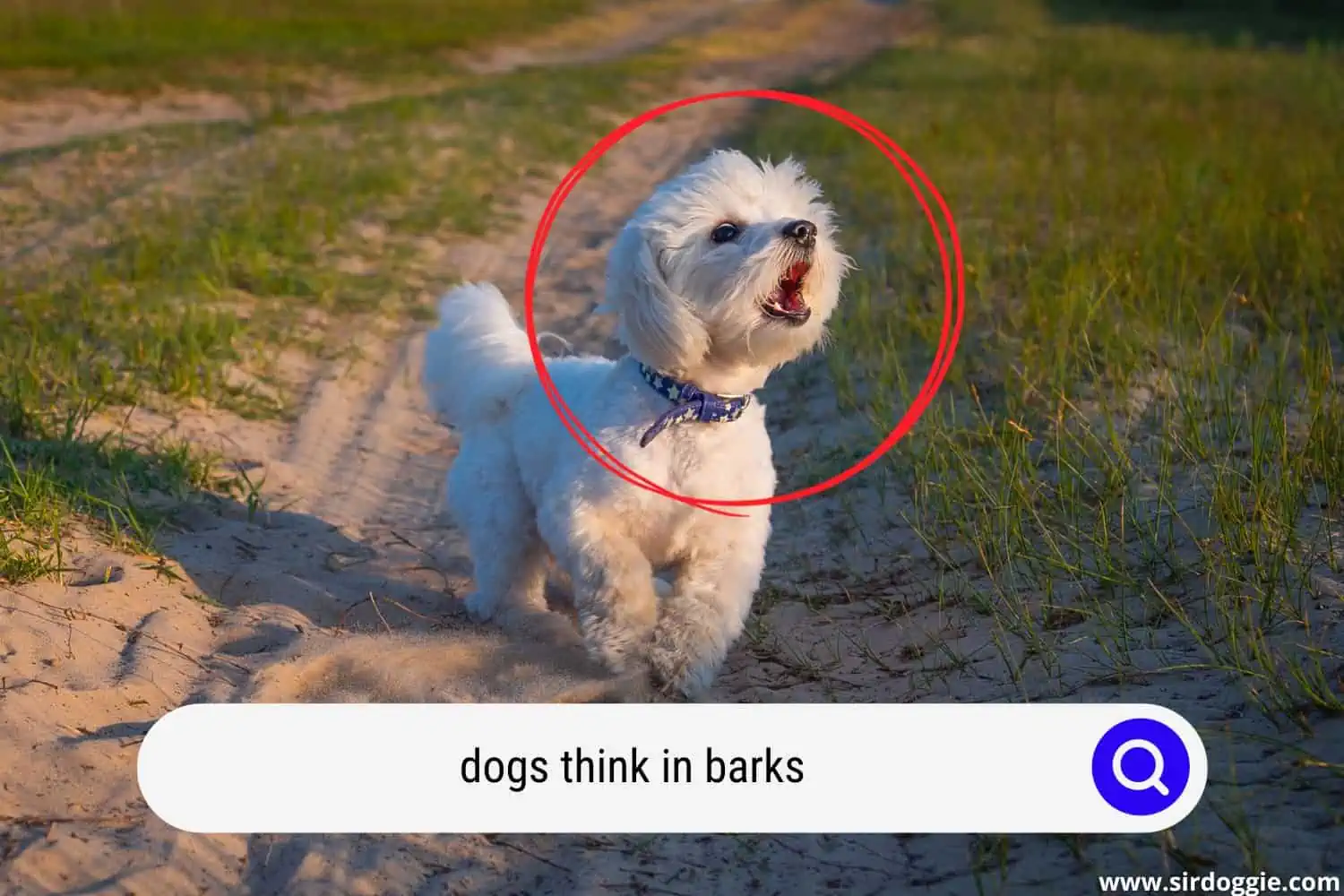Do Dogs Think in Barks? Read This First!
As a dog owner, you are probably used to your best friend yipping and barking, yowling, and howling at some point. Barking is a natural behavior for dogs, and dogs may bark for several reasons, including guarding their territory, out of anxiety, out of play, out of fear, or out of just plain boredom. You may wonder at the time if your best friend can think in barks.

Do Dogs Think in Barks?
The answer to this question is we don’t know for sure. Dogs communicate with each other and their humans by barking, but they use body language as well. Your canine companion may bark to get a treat, but she may also use specific actions such as pawing at your leg or giving you that heart-melting “cow-eyed” look until she gets what she wants.
We know that dogs think and communicate and that thinking must be involved in barking, but the answer to the question “Do dogs think in barks?” can only be answered by our furry friends.
Barking, as a form of communication, entails some sort of thought process on the part of your dog, and given that dogs can understand more than 100 words, our furry friends are smarter than we think. If you train your dog to bark for a treat, we can guess that your dog associates barking with a treat, but studies have not shown whether or not your dog is thinking of a treat when she barks.
Can Dogs Think?
The answer to this question is yes. Studies show that many species of animals perceive the world in ways similar to humans, especially those species that live in social groups. Dogs can’t read or write, so scientists suggest that they don’t think in words and symbols as we do. But, dogs can be taught to recognize symbols and words and their associations, but this is usually a result of training and not instinct.
Dogs are intelligent too, and studies show that they can understand over 150 words and can trick other dogs and humans to get treats. Rico, the famous border collie knows at least 200 spoken words and has demonstrated ’fast-track learning,’ which scientists previously thought was limited to humans and the great apes.
Barking is an Instinct
Instinct plays a big part in dog behavior, and different situations produce different reactions, and as a result, different barks. Barking may not necessarily be classified as a language, but more of an instinctual form of communication. Dogs can understand the human language, and respond to various verbal commands.
Since their domestication 20,000-40,000 years ago, dogs have learned to communicate with us humans and can understand large vocabularies, body language, compound sentences, and upwards of 1,000 words if trained properly.
Like many other animals, dogs use verbal and nonverbal cues to communicate, and for our canine companions, barking is completely normal behavior and one of the most effective ways dogs know how to communicate with their owners. Dogs use barking to communicate a variety of feelings, so to fully understand what your dog is saying, it’s important to put your dog’s barking into context with their body language as well.
Why Do Dogs Bark?
Instinct plays a big part in dog behavior, and different situations produce different reactions, and as a result, different barks. Barking may not necessarily be classified as a language, but more of an instinctual form of communication. Dogs can understand the human language, and respond to various verbal commands.
Since their domestication 20,000-40,000 years ago, dogs have learned to communicate with us humans and can understand large vocabularies, body language, compound sentences, and upwards of 1,000 words if trained properly.
Like many other animals, dogs use verbal and nonverbal cues to communicate, and for our canine companions, barking is completely normal behavior and one of the most effective ways dogs know how to communicate with their owners. Dogs use barking to communicate a variety of feelings, so to fully understand what your dog is saying, it’s important to put your dog’s barking into context with their body language as well.
We know that dogs can think and that barking is a form of communicating their thoughts, but that brings up another question: why exactly do dogs bark?
Why Exactly Do Dogs Bark?
There are several reasons why dogs bark, and below is a list of some reasons.
Play
You will probably notice that your playful canine might bring over a ball to you, and stand there, tail wagging barking at you to take time out for a game of fetch. Dogs will bark to initiate play with another dog or person, and they may bark the whole time they’re playing.
Greeting
There’s nothing nicer than coming through the door at the end of the day and having your best friend bark a hearty greeting at your homecoming.
Lonely
Dogs who are left alone all day, or who don’t have regular socialization, may bark out of frustration because they are lonely, and may bark to get attention.
Defense
Dogs, especially breeds designed for protection, will bark at strangers or a perceived threat to scare them away. Dogs will also bark to sound an alarm that there is an intruder or impending danger, and the body posture may be tense and include a straight tail and ears and head at attention.
Fear/Surprise
Dogs will also bark out of surprise or fear. If your dog is surprised by a bird that suddenly flies out of a bush, she may bark in alarm. If your dog is afraid of a stranger, or a new dog, she may growl and bark, most often with her tail between her legs, her head low, and hackles up.
Pain
When dogs are in pain, they may bark as well but maybe more due to communicating to their owners that they are painful, or that certain behavior is causing them pain and they want it to stop.
Barking from boredom
When dogs are bored, they may bark to get your attention to get you to interact with them. Some breeds are very active and may develop destructive behaviors if they are not mentally and physically stimulated. Smart dogs may even bring a leash or a ball to you to get you to go for a walk or play a game of fetch.
Dementia
As dogs get older, they may show changes in behavior such as barking at night or barking at something that’s not there. If you notice your older dog barking at a wall, or barking at nothing, you may want to make an appointment with your veterinarian.

Final Thoughts
Barking is one form of vocal communication for dogs, and each type of barking performs a specific function, protecting the home, in play, or wanting a treat. Just as humans talk to express emotions, dogs bark to express their feelings as well, and barking is just one form of communication for our canine companions. Dogs also use body language to express emotions and feelings as well, just as humans do.
As far as dogs thinking in barks, we do know that they can think and that barking is a form of communication, however, we do not know for sure if dogs think in barks. Perhaps future canine behavior research will someday help to answer this question.

Family Dog Expert Author
Hi there! I’m Stuart, a devoted dog lover and family dog expert with over a decade of experience working with our furry companions. My passion for dogs drives me to share my knowledge and expertise, helping families build strong, loving bonds with their four-legged friends. When I’m not writing for SirDoggie, you’ll find me hiking, playing with my beautiful dog, or studying music.